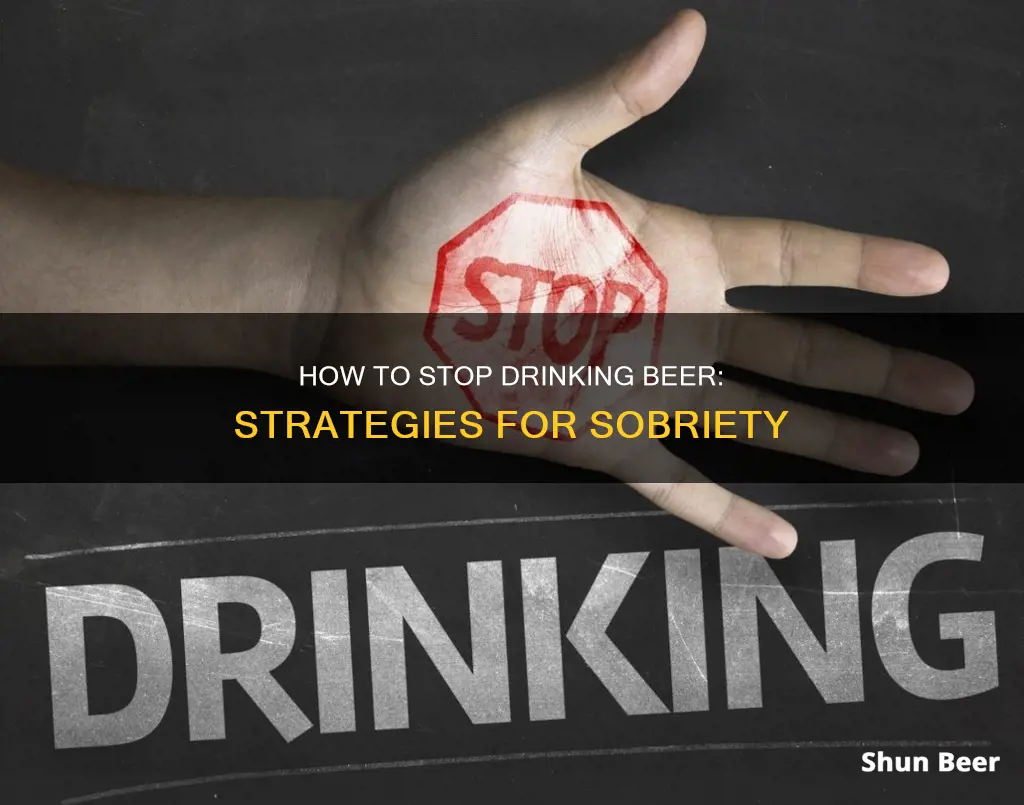
There are many reasons why someone may want to stop drinking beer. For some, it is a lifestyle change to improve their health, while for others, it is essential for medical reasons. Regardless of the reason, it is important to understand your relationship with alcohol and set clear and realistic goals. This may involve seeking professional help and building a support system of family and friends who can encourage you throughout your journey. It is also crucial to identify triggers and develop healthy habits to replace drinking.
| Characteristics | Values |
|---|---|
| Make a list of reasons to stop drinking | Feeling healthier, saving money, improving personal relationships and work life, etc. |
| Set a drinking goal | No more than one standard drink per day for women and men over 65, and no more than two standard drinks per day for men under 65 |
| Keep a diary of drinking | Record what and how much you drank, where you were, and compare this to your goal |
| Don't keep alcohol at home | N/A |
| Drink slowly | Sip your drink, and drink soda, water, or juice after an alcoholic beverage |
| Choose alcohol-free days | Abstain from drinking for a day or two each week, or for a week or a month |
| Watch for peer pressure | Practice ways to say no politely |
| Keep busy | Take a walk, play sports, go out to eat, catch a movie, start a hobby, etc. |
| Ask for support | Let friends and family know that you need their support |
| Guard against temptation | Steer clear of people and places that make you want to drink |
| Be persistent | Most people who successfully cut down or stop drinking do so only after several attempts |
What You'll Learn

Understand your relationship with alcohol
Understanding your relationship with alcohol is a key first step in giving it up. Here are some ways to do that:
Identify your reasons for drinking
Knowing why you drink is essential. Common alcohol triggers include stress, boredom, and socialising with certain friends. Becoming more aware of your alcohol triggers and reasons for drinking can help you plan ways to help manage the urge to drink.
Figure out how much you actually drink
Maybe you don't think you depend on alcohol, but you still wonder whether you might be drinking too much. "A quick drink" often turns into three or four drinks, especially in the company of friends.
Identify your triggers
Identify the times when you would usually drink and fill the gap with something else. For example, if you usually head to the pub after work, organise to meet friends at the cinema instead. If you tend to drink in front of the TV after work, do something active instead.
Make your intentions known
Tell your family and friends that you're aiming to stop drinking alcohol and explain why. This way, you can share your successes with them, and they'll understand why you've started turning down drinks or trips to the pub.
Identify your "go-to" drink
Choosing the right replacement beverage can help you stand firm in your desire to stop drinking. Water, flavoured sodas, teas, and other beverages can all help replace alcohol.
The Great American Beer Festival: What's on Tap?
You may want to see also

Identify triggers and develop strategies to manage them
Identifying triggers and developing strategies to manage them is a crucial step in reducing or eliminating your beer consumption. Here are some tips to help you achieve this:
- Identify your triggers: Recognise the situations, places, or emotions that tempt you to drink beer. For example, drinking with friends at a bar, feeling stressed or overwhelmed, or having a drink after work. By becoming aware of your triggers, you can develop strategies to avoid or manage them effectively.
- Avoid tempting situations: If possible, stay away from places or events that trigger your beer drinking. For instance, if parties or sporting events are your triggers, consider avoiding them for a while. If you can't avoid certain situations, make a plan to resist the urge to drink. For example, bring a supportive friend as your accountability partner.
- Practise saying no: Prepare yourself to say no politely when offered a beer. You don't have to drink just because others are, and you shouldn't feel obliged to accept every drink offered. Practise saying "No, thanks" confidently.
- Change your routine: If drinking beer is part of your daily routine, such as drinking in front of the TV after work, replace it with a different activity. Try doing something active, like going for a walk or trying a new hobby. This will help distract you from old habits and form new, healthier ones.
- Find alternative drinks: Choose non-alcoholic beverages that you enjoy and make them your go-to drinks. Water, fruit juices, herbal tea, or sparkling beverages can be great alternatives to beer.
- Meditate and practise self-care: Meditation can be a powerful tool to manage cravings and increase self-awareness. Set aside time each day to meditate, practise deep breathing, or engage in activities that promote relaxation and self-care. This can help you feel calmer and more in control when faced with triggers.
- Spend time with supportive people: Surround yourself with friends and family who respect your decision to quit drinking beer. Their encouragement and support can make a big difference in your journey.
- Reward yourself: Set short-term goals, such as an alcohol-free week or month, and reward yourself when you achieve them. For example, treat yourself to something nice with the money you save by not buying beer.
Naruto Fans: Beer Drinking with a Ninja Twist
You may want to see also

Set clear and realistic goals
Setting clear and realistic goals is an important step in achieving any endeavour, and it is no different when it comes to stopping drinking beer. Here are some tips to help you set effective goals in your journey towards reducing or eliminating your beer consumption:
- Understand your drinking habits: Start by assessing how much you drink and how often. This will help you determine the extent of the changes you need to make and set a baseline for your goals. Be honest with yourself during this step, as it is crucial for your success.
- Decide on your drinking goal: Based on your assessment, decide on a specific and measurable goal. For example, you may aim to reduce your beer consumption to a certain number of drinks per week or quit drinking beer entirely. Ensure that your goal aligns with your reasons for wanting to stop drinking beer.
- Make your goal achievable: While it is important to challenge yourself, setting a goal that is unrealistic will only set you up for disappointment. Consider your lifestyle, commitments, and previous attempts to cut down on drinking. Set a goal that is achievable yet still pushes you to make positive changes.
- Set a timeline: Determine a realistic timeline for achieving your goal. For example, you may aim to reduce your beer consumption by a certain amount within the next month or quit drinking beer entirely within the next two months. Having a timeline will help you stay focused and motivated.
- Create a plan: Develop a detailed plan of action that outlines the steps you will take to achieve your goal. For instance, if your goal is to quit drinking beer, your plan may include getting rid of all beer in your home, avoiding places where you typically drink beer, and finding alternative beverages to drink instead.
- Break your goal into smaller milestones: Breaking your overall goal into smaller, manageable milestones will make it feel less overwhelming and help you stay motivated. For example, if your goal is to quit drinking beer entirely, you may set milestones for reducing the number of beers you drink each week until you eventually reach zero.
- Monitor your progress: Regularly assess your progress towards achieving your goal. Keep a journal or use an app to track the number of beers you drink, the situations that trigger your drinking, and how you feel when you do or don't drink. This will help you identify patterns and make any necessary adjustments to your plan.
- Seek support: Let your family and friends know about your goal and ask for their support. Consider joining a support group or seeing a therapist who can provide additional guidance and accountability.
Remember, it is important to be kind to yourself during this journey. Change doesn't happen overnight, and there may be setbacks along the way. Stay focused on your goal, and don't be afraid to adjust your plan as needed to ensure it remains realistic and achievable.
Viking Beer: Ancient Ales and Historical Brews
You may want to see also

Build a support system
Building a support system is a crucial aspect of successfully stopping drinking beer. Here are some strategies to help you build a strong support network:
- Inform your family and friends about your goal: Explain to your loved ones that you are aiming to stop drinking alcohol and share your reasons for doing so. This will help them understand your decision and provide an opportunity to ask for their support. It can also encourage others to join you in cutting down or quitting.
- Find a supportive friend to be your "accountability buddy": Having someone close to you who understands your goal and can accompany you in social situations where alcohol is present can be incredibly helpful. They can help you stay accountable, provide emotional support, and assist in removing temptations or triggers.
- Join support groups: Support groups, such as Alcoholics Anonymous or SMART Recovery, can provide valuable peer support and guidance. These groups offer a sense of community and allow you to connect with others who are going through similar experiences.
- Seek professional help: Consider reaching out to a therapist or counsellor who specialises in addiction treatment. They can provide you with additional tools, strategies, and support to help you through the process.
- Utilise online resources: There are online platforms, such as Drinkchat and Drinkline, that offer confidential advice and support for people concerned about their drinking. These services can provide you with additional guidance and help you feel less alone in your journey.
Beer and Adderall: A Risky Mix?
You may want to see also

Find alternatives to beer
Carbonated drinks
Carbonated beverages such as sparkling water with lime, lemon, ginger, or mint can give you the same satisfying fizziness that you get from beer.
Fancy carbonated drinks
Fancy carbonated drinks can also help you mingle and feel less out of place in settings where others are drinking alcohol, since they superficially resemble many alcoholic drinks.
Alcohol-free beer
Alcohol-free beer is also an option if you really crave the taste of beer but want to avoid the alcohol content. However, keep in mind that many "alcohol removed" beers do contain a very small amount of alcohol.
Fruit juice
Fruit juice can be a good alternative to beer.
Herbal tea
Herbal tea can be a good alternative to beer.
Sports drinks
Electrolyte-rich sports drinks can be a good alternative to beer.
Mocktails
Mocktails can give you the flavor of a mixed alcoholic drink without the harmful effects.
Alcohol-free wine
You can try alcohol-free wine as an alternative to beer.
Non-alcoholic cider
Non-alcoholic cider is another option to replace beer.
Beer and Theraflu: A Safe Mix?
You may want to see also
Frequently asked questions
There are many reasons to stop drinking beer. You might want to improve your health, lose weight, or save money. You might be trying to say goodbye to hangovers and sleep better. Or, you might have a medical reason, such as liver disease, or a medication that reacts badly with alcohol.
Alcohol addiction is a form of substance abuse that can severely impact your physical and mental health. If you are addicted, you may experience physical withdrawal symptoms when you stop drinking, such as shaking, sweating, nausea, vomiting, or even seizures. If you think you may be dependent on alcohol, you should consult a doctor or healthcare professional.
Some practical steps include setting clear and realistic goals, building a support system of family and friends, and finding tasty non-alcoholic alternatives to beer. You can also try to replace your drinking habits with healthier ones, such as exercise, meditation, or eating a balanced diet.
Let your friends and family know that you are trying to stop drinking, and ask for their support. Avoid situations where you may be tempted to drink, such as pubs or social gatherings that involve alcohol. Stay away from people who encourage you to drink, and practice ways to say no politely.
Stopping drinking beer can bring about many positive changes in your life. You may find that you have more energy, sleep better, lose weight, and improve your relationships. You will also lower your risk of alcohol-related health issues, such as liver disease, heart disease, and certain types of cancer.







